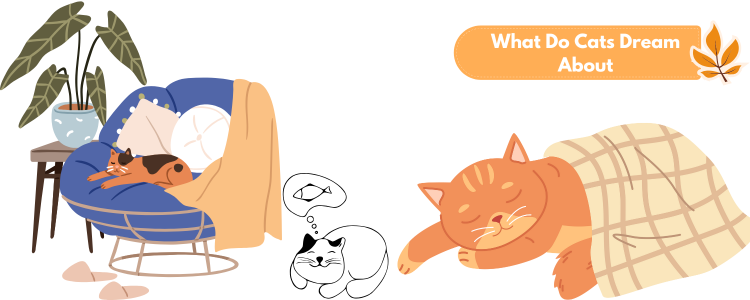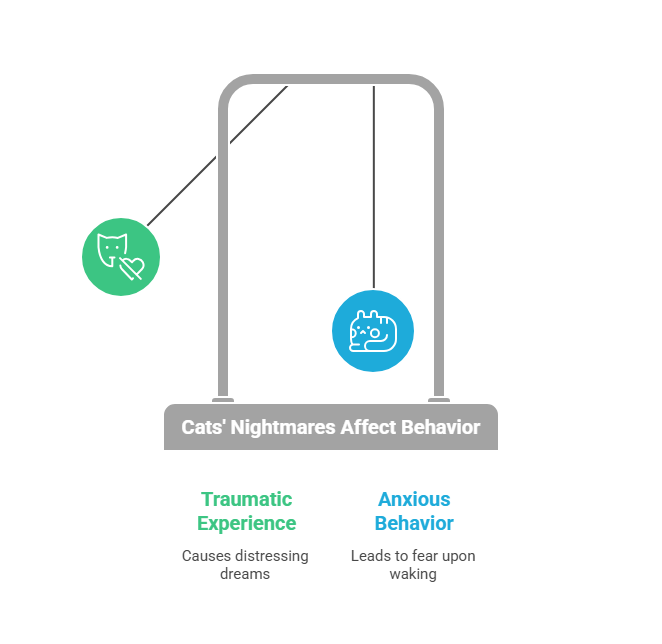Ever wondered what goes on in your cat’s mind while they’re fast asleep? You might be surprised by the answer. Cats spend a significant amount of their day sleeping, often up to 16 hours or more. As they snooze, there’s a chance they’re dreaming, much like we do. But what exactly do cats dream about? Let’s dive into this intriguing topic and uncover some fascinating facts.
The Mystery of Cat Dreams: What Do Cats Dream About?
Cats are curious creatures, and so are their sleep habits. Understanding what cats dream about starts with understanding how they sleep. Cats experience rapid eye movement (REM) sleep, the stage where most dreaming occurs. During this phase, their bodies may twitch, their eyes might move under their eyelids, and they may even make soft sounds.
But why do cats dream? What might they be dreaming about? While we can’t directly ask our feline friends, science provides some clues.
Do Cats Really Dream?
Yes, cats do dream! In fact, most mammals experience REM sleep, and this is where dreams happen.
According to Dr. Stanley Coren, a renowned expert on animal behavior,
“It’s likely that cats, just like humans, process daily experiences and emotions through dreams during sleep.”
Cats, being predators by nature, probably dream about hunting, playing, and other instinctual behaviors.
Can Cats Dream About People?
Cats form strong bonds with their owners, and it’s possible that they dream about the people they love. Many cat owners notice their cats purring or twitching when they’re near, possibly dreaming of familiar faces or interactions. While it’s unclear how much cats understand their dreams, experts believe that their dreams may involve memories of positive experiences.
What Do Cats Dream About? Insights from Science
Dr. Deborah Wells, a professor of animal behavior, explains that
“Cats’ dreams likely involve their daily experiences, such as chasing toys, climbing, or even interacting with other pets.”
Given their playful nature, cats might dream of their favorite activities, including stalking or pouncing. Cats are territorial creatures, so their dreams might also include scenes of defending their space.
Moreover, studies show that younger cats and kittens are more likely to experience intense dreams, especially related to play and exploration. As cats grow older, their dreams might focus more on relaxation or companionship.
What Happens in a Cat’s Brain During Sleep?
A cat’s brain during sleep works similarly to ours. When cats are awake, their brains are alert and active. However, during sleep, their brains enter a state of rest and recovery, which includes dreaming. According to the American Animal Hospital Association (AAHA), cats’ sleep patterns are divided into light sleep and deep sleep phases, with REM sleep being the most intriguing. In REM sleep, the brain activity of cats is very similar to that of humans, which is why it’s believed that cats experience dreams just like we do.
Can Cats Control Their Dreams?
It’s unlikely that cats can control their dreams, as we might be able to in certain lucid dreaming states. However, it’s possible that the content of their dreams is influenced by their daytime activities. If your cat spends a lot of time playing with a favorite toy, it might dream about chasing it in their sleep. In contrast, a cat that spends the day lounging by the window may dream about relaxing or watching birds fly by.
Signs Your Cat is Dreaming
Have you ever noticed your cat twitching, flicking its tail, or making little noises while sleeping? These are all signs that your cat might be dreaming. Twitching and paw movements are common during REM sleep, and these movements are often associated with dreaming. If your cat appears to be reacting to something in their sleep, it could be a sign that they’re experiencing a dream.
The Role of Dreams in a Cat’s Development
Dreams may play an important role in a cat’s development and emotional well-being. For kittens, dreaming might help them practice important skills like hunting or playing. This can help them refine their physical abilities in a safe, dream-induced environment. For adult cats, dreaming may provide a way to process emotions, helping them cope with stress or anxiety.
Could Cats Have Nightmares?
Just like humans, cats might have nightmares. If a cat has a frightening experience during the day, such as a traumatic event or a scary encounter with another animal, it could carry over into their dreams. Nightmares could cause your cat to twitch violently or even wake up suddenly in a state of fear.
If you notice your cat seems anxious or fearful after waking from sleep, it could be due to a disturbing dream or nightmare.
Can Cats Dream of Their Owners?
Absolutely! Cats can form strong attachments to their owners, and these emotional bonds might influence their dreams. Cats may dream of spending time with you, being petted, or even playing together.
Dr. Jennifer Coates, a veterinarian, states,
“Cats have highly developed senses and often associate their owners with positive experiences, making it likely that they dream about them.”
Understanding Your Cat’s Dream World
While we may never fully understand what cats dream about, there are some things we can do to make their sleep environment more comfortable. Providing your cat with a peaceful, quiet place to sleep can promote better rest. Regular playtime before bed can also help them release energy, possibly leading to more restful sleep and pleasant dreams.
The Fascinating Science Behind Cat Sleep Patterns
Cats’ sleep habits are different from humans. Cats are crepuscular, meaning they are most active during dawn and dusk. This behavior is related to their natural hunting instincts, as they are predators that often hunt at twilight. As a result, cats may sleep more during the day, entering different sleep phases, including REM, where dreams are likely to occur.
What Do Cats Dream About? 7 Fascinating Insights You Didn’t Know
- Hunting Dreams: Cats may dream about stalking and pouncing on prey. Their instincts are strong, and this behavior might carry over into their dreams.
- Social Dreams: Cats that have a strong bond with their owners may dream about interacting with them.
- Playful Dreams: Cats might dream about playing with their favorite toys or exploring new spaces.
- Relaxation Dreams: Older cats may dream about peaceful moments, like resting in a cozy spot.
- Nightmare Possibilities: Cats can have nightmares, often based on frightening experiences or unfamiliar environments.
- Territorial Dreams: Cats are territorial creatures, so they may dream about defending their space.
- Kittens and Play: Younger cats and kittens may dream more vividly about exploring their environment and playing.
FAQ: What Do Cats Dream About?
Q1: Do all cats dream?
Yes, most cats experience REM sleep, which is where dreaming occurs.
Q2: Can I prevent my cat from having nightmares?
Providing a calm, safe environment can reduce the likelihood of your cat having nightmares.
Q3: What signs should I look for if my cat is dreaming?
Twitching, tail flicking, and rapid eye movement are common signs that your cat is dreaming.
Q4: Can cats dream about their owners?
Yes, it’s very likely that cats dream about their owners, especially if they have a close bond.
Q5: Do kittens dream more than adult cats?
Yes, kittens tend to experience more vivid dreams, likely focused on play and exploration.
Although we can’t know exactly what cats dream about, we can appreciate the complexity of their sleep. From hunting and playing to spending time with their owners, cats likely experience a variety of dream scenarios. Understanding your cat’s sleep patterns can deepen the bond you share, and ensure they get the rest they need.




